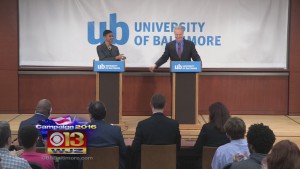
Rockville, Md., April 25 – In what has been described as a race centered on “identity politics,” Maryland Democrats face a significant choice as they look to replace an icon of the U.S. Senate. After 30 years of services, Sen. Barbara A. Mikulski, the senior senator of Maryland, is retiring. Mikulski was a trailblazing leader and was the first woman in the Democratic Party to win a seat in the U.S. Senate outright. The contest to choose her replacement has been closely fought, deeply dividing and has garnered national attention. This Tuesday, Democratic voters will choose between Congresswoman Donna F. Edwards from Maryland’s 4th district and Congressman Chris Van Hollen from Maryland’s 8th District. Even as the primary vote draws near, polling showing a tight race between Edwards and Van Hollen.
Whoever wins on Tuesday will go on to fight for the right to represent all Marylanders, including the more than 300,000 working-age Marylanders who have a disability. While neither Edwards nor Van Hollen include disability as part of their identity, both candidates have voted for bills that benefit people with disabilities while serving in the House of Representatives.

In addition, Van Hollen has served as a leader in the disability arena – leading the work to pass the bipartisan ABLE to Work Act, legislation that enables people with disabilities and their families to save money in special ABLE savings accounts without risking their eligibility for government benefits.
During a May 2015 debate with Edwards, Van Hollen highlighted his co-sponsorship of the ABLE Act.
“I don’t have a severe disability, people in my immediate family don’t have a severe disability,” Van Hollen said at the May 2015 debate. “[These] are issues of human rights and equal rights, and we need to be in that fight together.”
In contrast, Edwards focused on protecting benefits at the debate, saying, “Social Security and Medicare are bedrock fundamental principles of the Democratic Party.”
However, when the ABLE Act came to a vote, Edwards also supported the legislation and President Barack Obama signed it into law on December 19, 2015.
Van Hollen has spoken often about the critical employment challenges facing the one-in-five Americans who have a disability. In 2005, Van Hollen introduced the Disabled Federal Employees Protection Act. This bill, which did not become law, would have ensured that people with disabilities hired by the federal government through disability employment programs would not loose their jobs due to competition for low-cost contracts. In January 2015, Van Hollen organized a special Congressional Briefing on disability employment issues focusing on research being done by the American Institutes for Research on this topic.
In a recent interview with AUCD’s Liz Weintraub, Van Hollen spoke about the ABLE act, his campaign and disability issues in general.
“We were able to work together to get this done,” Van Hollen said of the bipartisan support for the ABLE Act. “This was a great example of people working together cross party lines. I mean, everyone looks at Washington, D.C., these days and looks at Capitol Hill – oh, what a mess; it’s all dysfunctional. This was a little ray of sunshine in the middle of all of that.”
Van Hollen also has stressed the importance of education for people with disabilities. Every session, Van Hollen introduces the Keep Our Promise to America’s Children and Teachers (Keep Our PACT) Act, which would fully fun No Child Left Behind and Individuals with Disabilities Education Act (IDEA). While he does not have a dedicated page on his website for people with disabilities, he does stress the importance of fully funding the IDEA, “finally fulfilling a promise Congress made in 1975 to help support education for students with disabilities” on his “expanding educational opportunity” page.
“While the federal government has provided a good amount of money, it has never met the promise that it made in terms of the total,” Van Hollen said of the lack of full federal funding for the IDEA in February. “So we’re pushing for a new bill that would require the federal government to meet those spending targets for IDEA.”
In 2010 Van Hollen became a co-chair of the Congressional Down Syndrome Caucus along with with Reps. Cathy McMorris Roders (R-WA) and Pete Sessions (R-TX) and Del. Eleanor Holmes Norton (D-DC), and has sponsored numerous bills that would benefit individuals with disabilities.
Van Hollen’s disability record shows that his focus is on ensuring that people with disabilities and their families can pursue employment, achieve independence and save money. By contrast, Edwards’ record in the House shows that her focus is on protecting Social Security and helping veterans with disabilities.

Edwards highlights Social Security in a web campaign ad, which features a constituent with a disability. In the ad, the constituent, a federal employee identified as Denise, talks about how Edwards helped ensure that she would receive Social Security disability benefits after being diagnosed with multiple sclerosis.
“She looked out for me,” Denise says in the ad. “She’s just like one of us, she understands.”
In 2011, Edwards strongly opposed considering cuts to Social Security benefits when members of Congress could not agree on a federal budget. During this primary season, Edwards has come under scrutiny for implying that Van Hollen is not as strong a defender of Social Security.
Edwards also has a page on her website dedicated to “supporting people with disabilities across Maryland.” On the page, her campaign stresses the importance of special education support services including extensive STEM curriculums to ensure the opportunity for “students with disabilities to be competitive in an integrated job market.”
Her website also highlights Edwards’ support of HR 803, the Workforce Innovation and Opportunity Act (WIOA), which helps improve support services and increase employment opportunities for Americans with disabilities.
“She is fighting for the expansion of high quality workforce services for people with disabilities, and recognizes that our workers with disabilities must have access to workforce and training services,” her website states.
Both Edwards and Van Hollen voted in support of WIOA.
In addition, Edwards, like both Democratic presidential hopefuls Hillary Clinton and Bernie Sanders, has called for the end of subminimum wage and the increase of the minimum wage for all workers including people with disabilities.
Edwards also has a record of speaking in support of bills designed to help veterans. According to a 2013 press release, the Congresswoman spoke in favor of a package of bills to address issues related to veterans including quickening the disability claims appeal process. Another bill she supported, the Veterans Housing Reform Act, would help veterans with disabilities get federal housing assistance. Van Hollen also voted for this housing act.
Maryland’s 622,682 citizens with a disability have two Democratic primary candidates with substantive records on voting for critical issues that impact the disability community. Yet, they each have different views on the issues, offering Maryland’s Democrats an important choice.
Race for Van Hollen’s Replacement in Maryland’s 8th District
The race in Maryland’s 8th District, which stretches from the northern Washington, D.C., suburbs north toward the Pennsylvania border, has eight candidates running in the Democratic primary to replace Van Hollen. But while Van Hollen has been lauded as a leader for disability rights in the Congress, none of his potential replacements have campaigned on disability issues.
In addition, none of the eight candidates have a place dedicated on their websites to issues important to the disability community. More than 50 percent of Americans report having a family member or close friend with a disability. Fifty-two percent of Democrats report that they or a loved one have a disability and they want to know that their elected officials represent them. One way to show that is having a website that is not only accessible to them, but also inclusive of their demographic and issues.

Be First to Comment